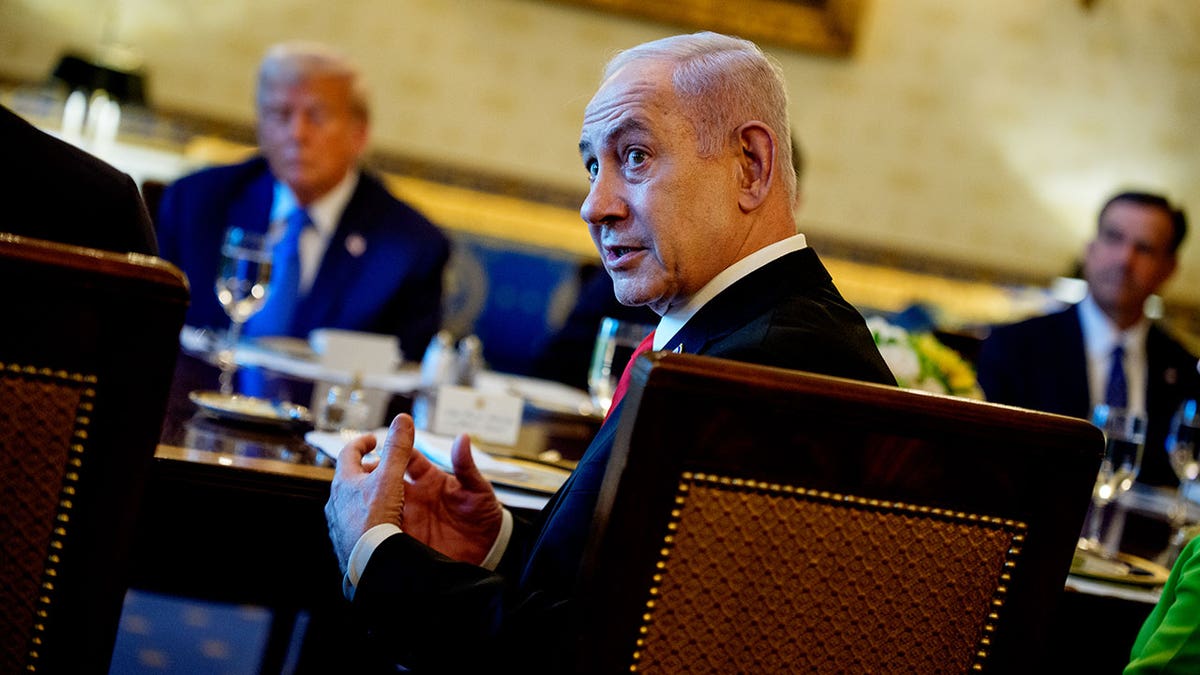NEWYou can now listen to Fox News articles!
President Donald Trump and Israeli Prime Minister Benjamin Netanyahu have said they believe a ceasefire with Hamas is “very close” to being secured.
“I will tell you we’re getting very close to a deal,” Trump said in response to a question from Fox News Senior White House correspondent Peter Doocy on Wednesday. “I don’t know if it’s secret or not secret, but doesn’t matter to me – secrets fine if it gets us to where we want to be, we want to have a ceasefire.
“We want to have peace. We want to get the hostages back. And I think we’re close to doing it,” he added.
NETANYAHU SAYS IRAN WILL ABANDON NUCLEAR PROGRAM AFTER US-ISRAELI STRIKES: ‘THEY’RE AFRAID’
Netanyahu echoed the sentiments in an interview with FOX Business’ Maria Bartiromo on “Mornings with Maria,” which aired earlier Wednesday. He said he believed there is a “good chance” that a 60-day ceasefire will be reached with the terrorist network.
“We are talking about a 60-day ceasefire in which half of the live hostages and half of the deceased hostages would be returned to Israel by these Hamas monsters,” he said following a Tuesday evening meeting with Trump. “I think we’re getting closer to a deal. I think there’s a good chance that we’ll have it.”

Israeli Prime Minister Benjamin Netanyahu meets with President Donald Trump during a dinner in the Blue Room of the White House on July 7, 2025. (Andrew Harnik/Getty Images)
NETANYAHU SAYS IRAN WILL ABANDON NUCLEAR PROGRAM AFTER US-ISRAELI STRIKES: ‘THEY’RE AFRAID’
Ahead of the high-level meetings this week, Trump was expected to pressure Netanyahu to secure a deal to end Israel’s war in Gaza and return all 50 hostages. The Israeli government assesses 28 of the hostages to be deceased, including Hadar Goldin, who was taken in 2014, and 27 hostages who were abducted on Oct. 7, 2023 – including Americans Omer Neutra and Itay Chen.
This leaves 22 hostages still assessed to be alive, though some comments by Netanyahu have suggested that the fate of several of the hostages remains unknown. In his sitdown with Bartiromo, the Israeli leader said there were “20 alive left and 30 deceased.”
“I’m committed to getting all of them out and getting Hamas out of the picture,” he added, comparing the terrorist network to the Nazi SS.
Special Enovy to the Middle East Steve Witkoff on Tuesday told reporters he plans to head to Doha this week to continue negotiations with mediators, which began Sunday.
Witkoff also reportedly said he is hopeful a deal can be secured this week.

President Donald Trump hosts Israeli Prime Minister Benjamin Netanyahu at the White House on July 7, 2025. (Photo by Andrew Harnik/Getty Images)
AFTER SETBACK TO IRAN’S NUCLEAR PROGRAM, TRUMP EXPECTED TO LEVERAGE MILITARY SUPPORT IN NETANYAHU MEETING
The exact hiccups in the negotiations remain unclear, though disagreements over Israel’s continued military presence in the Gaza Strip and a day-after plan for the Palestinians have long plagued the talks.
Bartiromo also questioned Netanyahu over frustrations that have mounted between the international community, Israel and the U.S. over the distribution of aid through the Gaza Humanitarian Foundation (GHF) instead of the United Nations.
“We have our own distribution system that has been established to prevent Hamas from stealing the food that is supposed to go to the population,” Netanyahu said. “They steal it, they take it for themselves, and the remainder they hike the prices and basically extort the Palestinian population in order to use it to continue recruiting people to their war machine.”

Palestinians carry bags and boxes containing food and humanitarian aid packages delivered by the Gaza Humanitarian Foundation in Rafah, southern Gaza Strip, June 16, 2025. (AP Photo/Abdel Kareem Hana)
CLICK HERE TO GET THE FOX NEWS APP
Netanyahu said he does not want to give up the distribution system that has worked to ensure Hamas is not stealing aid and using it as a black market commodity to extort civilians and a terrorist recruitment tool.
While the U.N. has been continuing to distribute aid in Gaza, its convoys have repeatedly been attacked and ransacked by suspected Hamas terrorists.
The Israeli prime minister said he expects the U.N. and GHF will be distributing aid under the 60-day plan.

